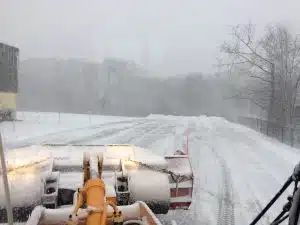You’ve got to be kidding me!
Plenty of cold, snow this winter for Northeast, Farmers’ Almanac says
WCVB Updated: 2:35 PM EDT Aug 13, 2017
Northeasterners, keep your mittens, boots and snow shovel handy.
The Farmers’ Almanac that goes on sale this week predicts a snowy winter from Maryland to Maine with five coastal storms to bring winter misery to the region.
The publication, now in its 200th year, isn’t afraid to go out on a limb with long-term weather forecasts that rely on a formula founder David Young first used in 1818 that utilizes sunspots, tidal action and other factors shunned by modern scientists.
Editors are looking to redeem themselves after missing the mark when heavy snow failed to materialize in the Midwest and the Middle Atlantic states were milder than anticipated last winter.
“Being in the business of predicting long-range weather forecasts is exciting, worrisome and rewarding,” managing editor Sandi Duncan said. “Many of our readers rejoice when we predict cold and snowy conditions while others complain that it’s too cold and wet. Yet we have to stick by our predictions no matter what Mother Nature may throw at us.”
The 2018 edition dubbed this winter: “The cold, the dry, and the wet, and the wild.” Its reclusive weather prognosticator, who works under a pseudonym, suggests colder-than-normal temperatures for eastern and central regions, wetter-than-normal weather for southeastern states and drier-than-normal conditions for the nation’s western third that was pummeled by snow last winter. It also predicts “wild” winter variations for the area where Arkansas, Louisiana, and Oklahoma meet.
Editors continue to stick to their timeworn formula, even though they admit forecasting is an “inexact science.”
Modern scientists are skeptical.
Maine state climatologist Sean Birkel prefers the National Oceanic and Atmospheric Administration’s number-crunching forecasts that rely on numerical models, statistics and observation.
There’s more than just weather in the almanac, which has a circulation of 2.1 million in North America. The Maine-based publication, not to be confused with the Old Farmer’s Almanac in neighboring New Hampshire, is finding new readers among Americans interested in where their food comes from, growing fresh produce in home gardens and finding a simpler way of living.
Many of those readers are city dwellers who may never set foot on a farm, editor Peter Geiger said.
The changing demographics inspired a change. The cover still features an old farmhouse but it also depicts skyscrapers, as well.


